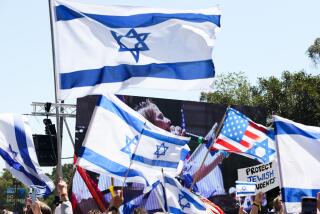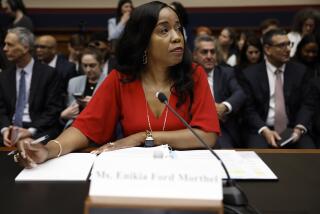Proposal to Teach Arabic Stirs Debate
- Share via
JERUSALEM — Israel’s first Arab Cabinet minister has called on the Education Ministry to make Arabic studies mandatory for every Jewish high school student, in a letter that has stirred lively debate here.
Officially, Israel has two national languages: Hebrew and Arabic. All Arab students study Hebrew from the third grade on and can receive a high school diploma only after demonstrating fluency in the language.
But although Arabic is the region’s dominant language and the mother tongue of the 18% of Israelis who are Arabs, few Jewish Israelis can speak, read or write it. Jewish Israeli students are not required to demonstrate fluency in Arabic to graduate from high school.
Salah Tarif, minister without portfolio in Prime Minister Ariel Sharon’s government, has challenged Jewish Israelis to master the language as a path into the cultural world of the Arabs, a bridge to building understanding of the Arab Israelis who are their neighbors and the Arab nations that surround them.
“It is amazing to discover that after 53 years, the state of Israel has not ensured that its Jewish citizens, too, know the Arabic language and culture proficiently,” Tarif wrote in a letter to Education Minister Limor Livnat.
“Israel is a Western and modern country, but one cannot ignore the fact that it is situated in the heart of the Arab world, a foreign and isolated island in a vast ocean of Arab nations,” Tarif wrote. “If indeed the state of Israel seeks true peace with the Arab world,” making Arabic studies mandatory for graduation would be a “welcome point of beginning.”
A Question of Identity in Israel
Tarif discussed his proposal with Livnat on Monday. Tarif’s spokesman said after the meeting that Livnat, who has made the bolstering of Jewish religious and cultural studies her top priority, promised to consider the proposal.
Tarif’s demand has raised anew the question of identity in a Jewish state that exists in the Middle East but has always found cultural affinity with the West. It is a debate made all the more complex and painful by more than eight months of bloody fighting with the Palestinians that has dimmed the prospects for achieving a regional peace settlement in the near future and strained relations between Jews and Arab Israelis.
Menachem Ben, a poet and literary critic, warned that studying Arabic could undermine Israel’s Hebrew culture and language. In a response to Tarif published by the Israeli newspaper Maariv, Ben branded the proposal “supposedly innocent but actually dangerous,” a move that, if adopted, could “speed up Israel’s Arab-ization.”
Being in a state of war with much of the Arab world “has brought about a blessed cultural and demographic rift between us and the Arab world around us and within us,” Ben wrote. “To bring about an end to the essential Hebrew-ness of this country, and to get all of our children accustomed to speaking Arabic--that’s all we need. I have no interest in understanding, in its origin, the language of the jihad preachers and the Arabic, anti-Semitic newspapers of hatred.”
Ben’s commentary was an extreme example of the linkage that many Israelis make between the Arabic language and the conflict with the Palestinians and the Arab states. Jewish Israelis prefer studying English or other Western languages, despite the fact that Arabic and Hebrew, both Semitic languages, have far more in common than Hebrew has with any Western language. It would be hard, educators say, to change their minds about Arabic.
“Morally, I support Tarif’s proposal,” said Shlomo Alon, the national coordinator for Arabic and Islamic studies in the Education Ministry. But he gave it little chance of being adopted.
“It is a problem of Israeli Jewish society to recognize ourselves as part of this area,” said Alon, who taught Arabic for decades in Israeli high schools before becoming an administrator. Alon said he can’t understand how the majority of Jewish Israelis can choose to ignore Arabic.
“Illusions are powerful,” he said. “But when an Israeli Jew opens his window in the morning, he is not looking out at the Swiss Alps. The Jewish people who live here are living in a country that speaks two languages, and they are part of an area that speaks Arabic.”
Some Israeli educators argue that instead of trying to teach resistant teenagers a difficult language they identify with their enemies, the system should instead focus on teaching them more about the culture and religion of the Arabs.
Veteran teacher Yitzhak Abadi said he found few takers when he began teaching Arabic at Beit Yerah High School on the shores of the Sea of Galilee in 1988.
Even the school’s generally politically liberal student body was turned off by the thought of studying Arabic, Abadi said. So five years ago, he and a team of professors, teachers and students set about creating a curriculum for studying the culture and religion of the Arab world.
Today, one-tenth of Beit Yerah’s 1,000-strong student body is enrolled in Abadi’s program. They study the origins of Islam, the political map of the modern Arab world, and Arab culture, music and art--all in Hebrew.
Goal of Breaking Down Stereotypes
“I view this as a mission,” the 67-year-old Abadi said, speaking in the bomb shelter he has converted into a classroom and research library. “Israelis see Arabs only through the cross hairs. After all these years of wars, there is a stigma.”
His goal, he said, is to break down some of the stereotypes by familiarizing students with the world of the Arabs.
North of Beit Yerah, in the upper Galilee, the Galilee School is trying a more radical solution. Jewish and Arab students there are being taught together by teams of Jewish and Arab teachers who teach in Hebrew and Arabic.
Kamal abu Younis, the Arab principal of the Galilee School, is convinced that such bilingual, bicultural education may offer the only hope of closing the vast cultural gap that exists between Arabs and Jews in Israel.
“It is not really possible to study a language out of the general context of its culture,” Younis said. In his school, “the languages are not only taught as words, but as an integral part of cultures. The teaching of language is intertwined with the various holidays and other events, thereby serving as a direct channel for accessing the culture of the other.”
The failure of Jewish Israelis to study Arabic, Younis said, “deepens the alienation felt by the Arab public. They feel this confirms their feelings that the Jewish population just doesn’t want them here, that they don’t even want to be able to communicate at a basic, functional level.”
If Israelis learned Arabic, he said, it “would at least show some willingness, some goodwill.” Just imagine, the principal said, that Jewish Israeli students could ask a visiting Arab dignitary questions in Arabic someday. “This,” he said, “would be very meaningful and significant.”
*
Batsheva Sobelman of The Times’ Jerusalem Bureau contributed to this report.
More to Read
Sign up for Essential California
The most important California stories and recommendations in your inbox every morning.
You may occasionally receive promotional content from the Los Angeles Times.













